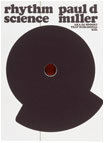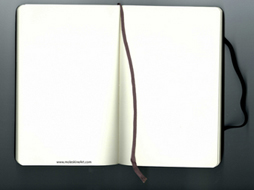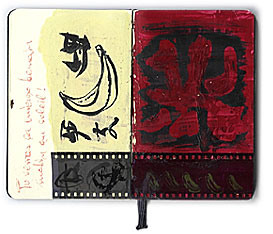 Last month, I had the good fortune to speak briefly with Peter Lunenfeld at the Scholarship in the Digital Age conference at USC. I was surprised to learn that this famous digital media theorist is currently obsessed with a print-based initiative. His new Mediaworks Pamphlets are “theoretical fetish objects for the 21st century” – elegantly produced collaborations between designer and writer, intended to break serious media theory out of “the hermetically sealed spheres of academia and the techno-culture” and into the public discourse, much like the famous collaboration between Marshall McLuhan and Quentin Fiore, “The Medium is the Massage.” By shifting reading, writing and design practices to the screen, Lunenfeld argues, digital media have effectively “taken the weight off” of the print codex, enabling its tactile qualities to flower anew.
Last month, I had the good fortune to speak briefly with Peter Lunenfeld at the Scholarship in the Digital Age conference at USC. I was surprised to learn that this famous digital media theorist is currently obsessed with a print-based initiative. His new Mediaworks Pamphlets are “theoretical fetish objects for the 21st century” – elegantly produced collaborations between designer and writer, intended to break serious media theory out of “the hermetically sealed spheres of academia and the techno-culture” and into the public discourse, much like the famous collaboration between Marshall McLuhan and Quentin Fiore, “The Medium is the Massage.” By shifting reading, writing and design practices to the screen, Lunenfeld argues, digital media have effectively “taken the weight off” of the print codex, enabling its tactile qualities to flower anew.  There is room now to play and invent in the realm of paper, and a resulting emphasis on the pursuit of pleasure and grace in the experience of book objects. As evidence of the resurgent fetish book, Lunenfeld points to the immaculate productions of McSweeney’s, which has made its mark by coupling serious literary output with elegant design at relatively low cost to the reader.
There is room now to play and invent in the realm of paper, and a resulting emphasis on the pursuit of pleasure and grace in the experience of book objects. As evidence of the resurgent fetish book, Lunenfeld points to the immaculate productions of McSweeney’s, which has made its mark by coupling serious literary output with elegant design at relatively low cost to the reader.
Another sign of this resurgence is the Moleskine phenomenon – those indelible oilskin-bound notebooks reissued in 1998 from the classic French design, famously employed by Chatwin in his travels, and, if the packaging is to be believed, by Hemingway, Van Gogh and Picasso as well.  Nowadays, Moleskines are favored by aesthetes and design sophisticates with a propensity for jotting things down, and is especially beloved by the blogging and techie communities, further evidence that this renewed fetish interest is intimately linked to the experience of networked, digital culture. In fact, Moleskine culture is a flourishing niche on the web, with blogs, art sites, and a full Wikipedia entry devoted solely to the flights of invention (Moleskine hacks etc.) and cult of personal record-keeping arising from this little black book.
Nowadays, Moleskines are favored by aesthetes and design sophisticates with a propensity for jotting things down, and is especially beloved by the blogging and techie communities, further evidence that this renewed fetish interest is intimately linked to the experience of networked, digital culture. In fact, Moleskine culture is a flourishing niche on the web, with blogs, art sites, and a full Wikipedia entry devoted solely to the flights of invention (Moleskine hacks etc.) and cult of personal record-keeping arising from this little black book.
Returning to Lunenfeld’s fetish theory with McSweeney’s as exemplar, it’s almost too perfect that McSweeney’s founder Dave Eggers’ new book of short stories, How We Are Hungry, should be bound exactly like a Moleskine, complete with elastic fastening band. But whereas my notebooks have held up admirably through miles of travel and years of abuse, the elastic strap of my copy of the Eggers book broke after a single day’s jostling in my bag. Take note, McSweeney’s…
if:book
A Project of the Institute for the Future of the Book
